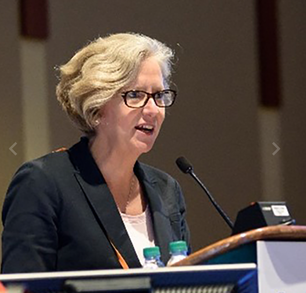
The European Vision Institute is thrilled to announce the “TOP LIST of excellent Women in European Vision Research and Ophthalmology 2021”. See full article
Sarah Coupland
Q1: Although their presence has grown steadily for the past 3 decades, women hoping for a career in Vision Research and Ophthalmology still face many obstacles. What would be in your opinion the three most important steps to make the field more diverse?
a) Encourage Vision Research and Ophthalmology at the very earliest levels of education – i.e. in secondary schools in all socio-economic areas and countries, as well as undergraduates in medicine and biology.
b) Inform the public and their families about the wonders (and the importance) of the eye at outreach activities, e.g. museums, interacting with people of all ages, particularly the young school pupils and undergraduates in medicine and biology.
c) At the above events, provide flyers or interactive media, which show photos of women in vision and ophthalmology and people of diverse backgrounds, as surgeons or as leading lab scientists (not only as nurses), to provide an image of possible attainment to the audience.
Q2: What is your professional achievement you are most proud of?
Being awarded the Naumann Prize for Ophthalmic Pathology in 2018 in Barcelona at the WOC. This is given out only every 4 years, after selection by an international committee.
Q3: To what extent do you have to blend your personal and your professional life to achieve a balance? What should change?
My professional and personal lives do indeed blend: it is difficult sometimes to draw boundaries between the two, particularly during the covid pandemic when virtual meetings are scheduled at all hours of the day! And yet it is important to do so, to maintain the success of both. One way I try to achieve a balance is by undertaking a range of outdoor activities – e.g. cycling or walking – which takes me away from my desk and enables me to be ‘unplugged’ for at least an hour a day!
Q4: The next time you talk to a 12-year-old girl who shows a passion for science and medicine, what would you most want her to know?
I would want her to know that it is not only possible for her to have such a career, but she could also be the best and a leader in either of these fields.
Prof. Sarah Coupland, MBBS, PhD, FRCPath
George Holt Chair of Pathology
Consultant Histopathologist @ Liverpool Clinical Laboratories
Vice President for Communications, Royal College of Pathologists
Lead of the Liverpool Ocular Oncology Research Group (LOORG)
Sarah Coupland
Q1: Although their presence has grown steadily for the past 3 decades, women hoping for a career in Vision Research and Ophthalmology still face many obstacles. What would be in your opinion the three most important steps to make the field more diverse?
a) Encourage Vision Research and Ophthalmology at the very earliest levels of education – i.e. in secondary schools in all socio-economic areas and countries, as well as undergraduates in medicine and biology.
b) Inform the public and their families about the wonders (and the importance) of the eye at outreach activities, e.g. museums, interacting with people of all ages, particularly the young school pupils and undergraduates in medicine and biology.
c) At the above events, provide flyers or interactive media, which show photos of women in vision and ophthalmology and people of diverse backgrounds, as surgeons or as leading lab scientists (not only as nurses), to provide an image of possible attainment to the audience.
Q2: What is your professional achievement you are most proud of?
Being awarded the Naumann Prize for Ophthalmic Pathology in 2018 in Barcelona at the WOC. This is given out only every 4 years, after selection by an international committee.
Q3: To what extent do you have to blend your personal and your professional life to achieve a balance? What should change?
My professional and personal lives do indeed blend: it is difficult sometimes to draw boundaries between the two, particularly during the covid pandemic when virtual meetings are scheduled at all hours of the day! And yet it is important to do so, to maintain the success of both. One way I try to achieve a balance is by undertaking a range of outdoor activities – e.g. cycling or walking – which takes me away from my desk and enables me to be ‘unplugged’ for at least an hour a day!
Q4: The next time you talk to a 12-year-old girl who shows a passion for science and medicine, what would you most want her to know?
I would want her to know that it is not only possible for her to have such a career, but she could also be the best and a leader in either of these fields.
Prof. Sarah Coupland, MBBS, PhD, FRCPath
George Holt Chair of Pathology
Consultant Histopathologist @ Liverpool Clinical Laboratories
Vice President for Communications, Royal College of Pathologists
Lead of the Liverpool Ocular Oncology Research Group (LOORG)


